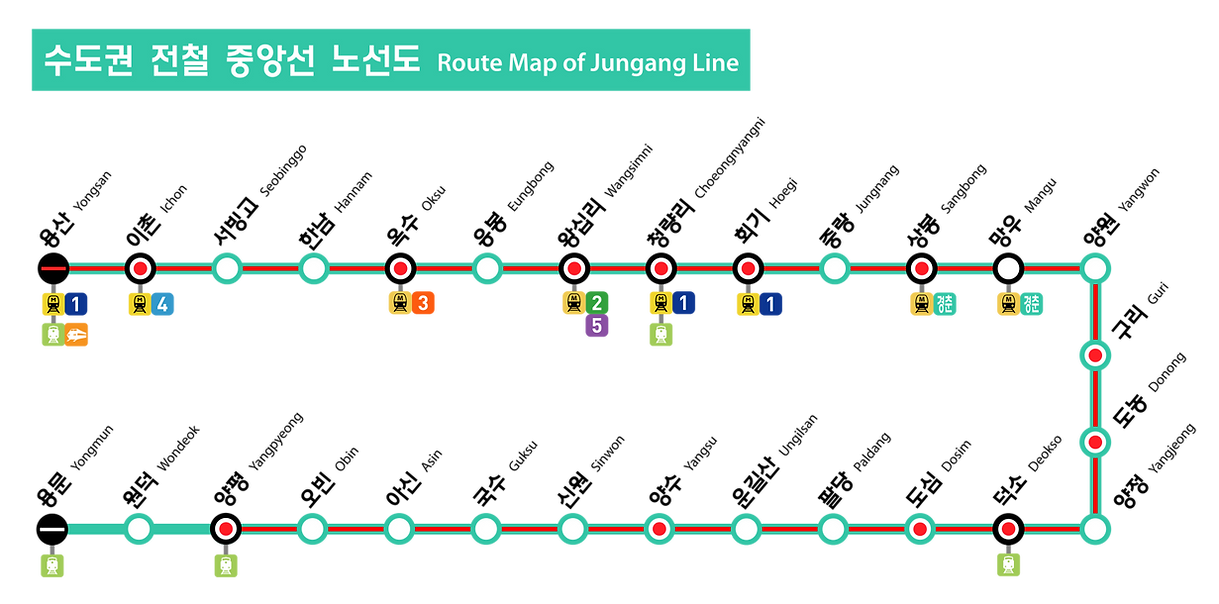Gyeongui-Jungang Line
The Gyeongui-Jungang Line was created by merging two separate lines, the Gyeongui Line and the Jungang Line, in 2014. It connects Seoul to the provinces in the north and east. It is marked with a turquoise color on maps.
Jungang Line
The Jungang Line opened on December 16, 2005 as the Yongsan-Deokso Line. It was created by separating the Gyeongwon Line branch between Yongsan and Cheongnangni on Line 1. As stated in the name, the line ran from Yongsan to Deokso.
The line was officially renamed to the Jungang Line when it was extended eastward from Deokso to Paldang on December 27, 2007.

Map of the Jungang Line before its merger. Express services are marked in red.
By 한국어 위키백과의 Snowleopard, CC BY-SA 3.0, https://commons.wikimedia.org/w/index.php?curid=34954625
The line was extended to Guksu on December 29, 2008.
The line was extended further east to Yongmun on December 23, 2009.
On December 21, 2010, Sangbong and Obin opened as in-fill stations.
Gyeongui Line
The Gyeongui Line opened on July 1, 2009, from Munsan to Digital Media City, with a spur line to Seoul Station.
On December 15, 2012, the line was extended eastward from Digital Media City to Gongdeok.

By 안양역(ksrt6848@naver.com) - Own work, CC BY-SA 3.0, https://commons.wikimedia.org/w/index.php?curid=23944293
The line was extended eastward from Gongdeok to Yongsan on December 27, 2014, officially merging the two lines.
Post-merger
Note: This map does not show Imjingang Station. Express services are highlighted in red and green.
From http://www.newstomato.com/one/view.aspx?seq=725351&repoter=%uae40%uc6a9%ud604
On October 31, 2015, Yadang Station opened between Tanhyeon and Unjeong.
On April 30, 2016, Hyochang Park Station opened between Yongsan and Gongdeok, opening a transfer with Line 6.
The line was extended one station eastward to Jipyeong on January 21, 2017.
On March 28, 2020, a new shuttle service was introduced, heading further north past Munsan to Imjingang. This completed the current line.
Trains frequently run between Yongmun and Munsan. Many trains stop at various locations on the line, such as Ilsan, Neunggok, Daegok, Yongsan, Cheongnyangni, Deokso, and Paldang. Some trains split at Gajwa, heading instead to Seoul Station. Four trains a day head past Yongmun to Jipyeong.
Several express services are offered:
-
Gyeongui Express (Seoul Station Branch)
-This service goes between Munsan and Seoul Station. It stops at Geumchon, Unjeong, Ilsan, Baengma, Daegok, and Haengsin. It then makes all stops between Digital Media City and Seoul Station.
-
Gyeongui Express (Main Line)
-This service goes between Munsan and Yongmun. It stops at Geumchon, Geumneung, Tanhyeon, Ilsan, Baengma, Daegok, Haengsin, Digital Media City, Hongik University, and Gongdeok. It then makes all stops between Yongsan and Yongmun. Some trains stop at Unjeong.
-
Jungang Express
-This service goes between Munsan and Yongmun. It makes all stops between Munsan and Ichon, then stops at Oksu, Wangshimni, Cheongnyangni, Hoegi, Sangbong, Guri, Donong, Deokso, Dosim, Yangsu, and Yangpyeong.

Imjingang Station.
By Christopher James Gordon - Own work, CC0, https://commons.wikimedia.org/w/index.php?curid=56565555
The line is currently 124 km (77 mi) long. As it is owned and operated by Korail, all track is on the left-hand side.
There are depots at Yongmun and Munsan.
All stations feature screen doors.

First generation Korail Class 331000 train 331x06.
By Minseong Kim - Own work, CC BY-SA 4.0, https://commons.wikimedia.org/w/index.php?curid=37805612

Korail Class 321000 train 321x16.
By Minseong Kim - Own work, CC BY-SA 4.0, https://commons.wikimedia.org/w/index.php?curid=37855467
The line is planned to be extended north to Dorasan Station by March 2021. The Imjingang shuttle service would be extended as well. Uncheon Station between Munsan and Imjingang is scheduled to open by December 2021.

Dorasan Station is the final station in South Korea before the DMZ. The station currently holds no practical purpose, merely existing for the hope of eventual Korean reunification.
By Leoparmr(talk / Contributions) at the English Wikipedia - File:Dorasan Station Outside.JPG from the English Wikipedia, Public Domain, https://commons.wikimedia.org/w/index.php?curid=4549939
You can read more about the trains running on this line here.
Back to History
Back to Seoul Metro
.jpg)